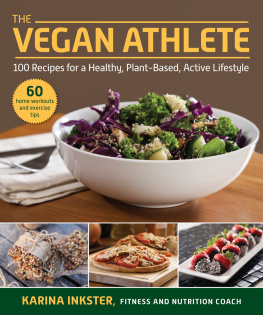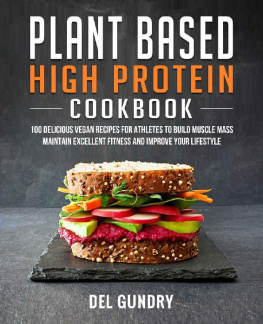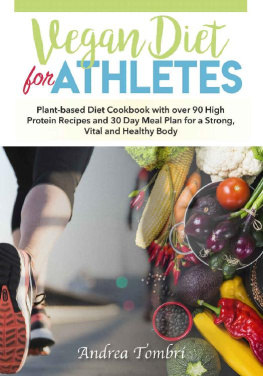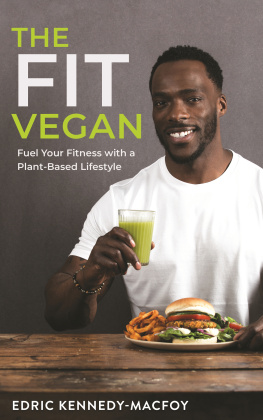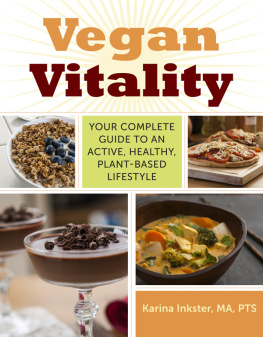No Meat Athlete- Beginner to Beyond
A Plant-Based Guide Includes 75 Recipes for Every Fitness Lover
ZimCore Fitness
Copyright 2021 ZimCore Fitness
All rights reserved
The characters and events portrayed in this book are fictitious. Any similarity to real persons, living or dead, is coincidental and not intended by the author.
No part of this book may be reproduced, or stored in a retrieval system, or transmitted in any form or by any means, electronic, mechanical, photocopying, recording, or otherwise, without express written permission of the publisher.
No Meat Athlete- Beginner to Beyond
A Plant-Based Guide Includes 75 Recipes for Every Fitness Lover
By
ZimCore Fitness
FOREWORD
E ven as interest in plant-based diets grows and this healthy way of life ends up being a more common part of mainstream culture, people are typically still amazed to hear that such a diet, free of animal items, is more than adequate to fuel active lifestyles-- from standard entertainment for fitness to severe athletic endeavors.
They're a lot more stunned when I tell them, in my books and in talks throughout North America, that I selected this diet plan exactly due to the fact that of what it could do for me as an athlete. When I decided in high school to try to end up being a professional endurance athlete, I try out all type of diet plans to find the one that would best support my dream. In the process of experimentation, I found that a plant-based diet stood alone as the one which most effectively permitted me to recover quickly from workouts, despite what coaches and others around me thought. The decreased healing time between workouts that resulted from my new diet permitted me to train harder and more frequently than the competition, and eventually, I see this benefit as the factor I prospered in ending up being a professional Ironman triathlete and have twice won the Canadian 50K ultra marathon champion.
The benefits of adopting a plant-based diet plan, though, go far beyond athletic efficiency. It's no secret that the basic American diet of processed and nutrient-devoid food has wreaked havoc on our health as a society, with weight problems levels even among kids skyrocketing to all-time highs as an outcome.
Ecologically speaking, consuming plants over meat makes good sense. Less land, water, and nonrenewable fuel sources enter the production of plants, and fewer CO2 emissions are produced. It's merely a matter of performance; more nutrition (micronutrients) can be acquired while spending less of each natural resource to get it.
And no matter what you may believe about the right or wrong of raising animals for food, the method our current food system deals with these animals-- with its focus on factory farming and profit above all else-- is tough to stomach.
It's incredible that a service so simple as adopting a plant-based, whole-food focused diet can have such a big impact on all of the above areas. And yet,
even when presented with the clear advantages of a plant-based diet, the large majority of individuals still consider this way of life to be far more extreme than might ever work in their lives. Therefore they do little bit, and as an outcome, very little modifications.
That's where No Meat Athlete comes in. If there's a single factor such a huge community of active, passionate people has actually grown up around No Meat Athlete
-- you've probably seen them in their running carrot shirts-- it's this: Considering the site has to do with eating a plant-based diet plan and running ranges the majority of people don't even like to drive (a way of life numerous would think about "severe"), Matt Frazier provides the tools and details he shares in a manner in which is downright friendly, leaving his readers stimulated with a sense of possibility and thinking, "Hey, I could in fact do this." Matt's technique to fitness is informed, inviting, and entirely nonjudgmental, with a consistent focus on simpleness and functionality (rather than outright excellence) when it concerns diet plan and physical fitness choices.
The food and viewpoint in the book you're holding represent an extreme enhancement over the method the majority of people-- even lots of active and health- conscious people-- fuel their everyday lives. However the method here isn't about being mechanical or rigid in your diet and workout routines or making huge sacrifices in your day-to-day life in return for incremental enhancements at the highest levels of athletic efficiency.
Instead, it's about the bigger image-- that of making broad modifications to your diet plan and exercise practices, changes that will have a lasting effect on your lifestyle and the lives of those you share the world with. It's about making this way of life work, even within the structure of the busy career and household lives the majority of us lead. And most importantly, it's about approaching these changes wisely and deliberately, in a manner that's intended-- above all else-- to make certain that this time, they last.
Congratulations on deciding to make a difference. Begin now, and it will not be long before your body is thanking you.
-- Brendan Brazier, very popular author of the Thrive book series
INTRO
As I passed the twenty-two-mile marker, I felt everything escaping. I had been here prior to: the point in a race where you understand that your goal is too huge, that today is not your day.
You hold on for a while longer, provide it everything you've got for a few minutes, and question why the rate you've held for 5 or 10 or twenty-two miles unexpectedly feels so hard. At some point, either because your body shuts down or you decide that failing will hurt less than your legs presently do, you provide up. That's where I was. Holding on, fending off the unavoidable for simply a couple of more minutes.
Possibly I had no service being here. As I looked around me and saw all these severe marathoners, athletes truly deserving of the label "runner," I felt like I didn't belong. I was a normal person who somehow fell into running, not a runner.
My Journey to the Greatest Marathon on the planet
7 years prior, I ran my very first marathon after 2 college friends and I decided we 'd do one, even though none of us understood much about running. However we were all in decent shape, so we intended high.
And we didn't simply set out to run a marathon. We were going to run it quickly enough to certify for the Boston Marathon, the most well-known and prestigious race in the world and one soaked in history as the world's oldest annual marathon.
The issue is, everybody wishes to run Boston, but the course can only accommodate numerous runners. To restrict entrants and position the race as one suggested for serious runners, the Boston Athletic Association imposed stringent certifying requirements in 1970. (" This is not a jogging race," stated the application to the 1970 marathon.) This limitation, naturally, just contributed to the prestige of the race, firing up the desire of marathoners everywhere to earn the right to call themselves "Boston qualifiers." For us, as males under thirty-five years old, that suggested running our marathon in 3 hours, 10 minutes, and 59 seconds or faster-- a 7:17 minute per-mile speed, for 26.2 miles.
We trained hard and put the miles in-- at. Then the aches, pains, midterms, and college parties took place.
Shockingly, all three people made it to the start line of our marathon in San Diego. Training hadn't been fantastic, however wed done enough to believe we could end up. And somehow, though it was the most uncomfortable day any of us had actually ever experienced, we did simply that.
Next page



